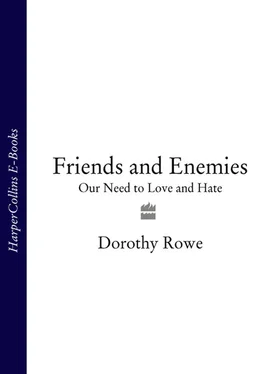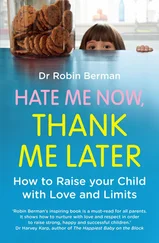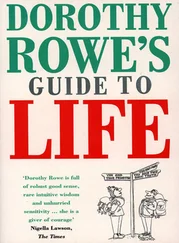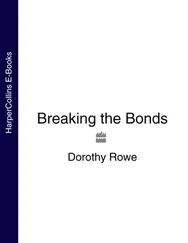I said, ‘You’re banging into Mummy now. Does that mean you’re not her friend? If you hit Mummy, are you being a friend to her?’
Alice went on smiling and thumping Jo. She said confidently, ‘She likes it.’
That’s the kind of logic which families use.
When I asked Miles if Alice was his friend he said, ‘Some of the time she is but some of the time she isn’t.’ However, when he went on to consider the matter he decided that Alice was his friend even though she did not always do what he wanted her to do.
I asked Miles if Mummy was a friend. He said most emphatically, ‘Yes,’ but went on, ‘Most of the time, except when she gets cross.’
‘Is Daddy a friend?’
Miles’s ‘Yes’ was more hesitant so I said, ‘You seemed like you weren’t too sure about that.’
‘Well, I was going to say that my dad’s a bit harsh on my mum because he makes her seem to be the baddie. He’s always threatening us with things like ‘Quick, get into the bath before your mum comes up.’
‘And what do you think of that?’
‘I don’t think it’s nice. I wouldn’t like it if I was made the baddie all the time.’
‘Do you think your mum and dad are friends with one another?’
‘Yes, or they wouldn’t have married and I wouldn’t probably be alive.’
Miles and Alice illustrate the perils parents face if they take their children’s point of view seriously and allow them to express their opinions. Such children do not hesitate to criticize their parents. But Miles and Alice also reveal the security which they take for granted like the air they breathe. They can criticize their parents, and everyone can get cross and shout at one another, but it is never more than a storm in a teacup, and the teacup is rock solid.
Not all families are like that. I asked my workshop participants, ‘Can family be friends?’ Here are some of their replies:
• ‘No. What prevents them being friends is trust. I cannot trust them with my emotions. My parents never respected my feelings and I could no more trust them now than I could as a child. We do not relate our feelings to each other.’
• ‘We have totally different value systems.’
• ‘I love my son but he is not my friend. The relationship is one-sided. I love my daughter and she is a friend. We have a supporting relationship.’
• ‘I can’t say that anyone in my family was a friend. My mother was particularly forbidding, full of repressed anger and without humour.’
• ‘I would like to think this is so but know that it is not because we come from the same situations with similar knowledge but different feelings.’
• ‘Many of my family will only accept me very conditionally and I am not willing to sacrifice myself in order to be accepted by them.’
• ‘Blood’s thicker than water because you share the same history and are used to familiar relationships. But it is harder to set yourself free.’
• ‘I have a sister I haven’t spoken to for several years because she hurt me many times. I feel it is safer for me not to have a friendship with her.’
• ‘I love my brothers but wouldn’t call them friends. There’s no one in my family I share myself with deeply.’
• ‘Sometimes it’s difficult for a relative to be a friend because they can’t stand back from the situation. They get too involved and emotional.’
• ‘I do not see all members of my family as friends but maybe members of the same tribe. Some are friends: all are friendly.’
• ‘Blood’s bloodier than water.’
Andrew Sullivan considered the question of friends and family:
Families and marriages fail too often because they are trying to answer too many human needs. A spouse is required to be a lover, a friend, a mother, a father, a soulmate, a co-worker, and so on. Few people can be all these things for one person. And when the demands are set too high, disappointment can only follow. If husbands and wives have deeper and stronger friendships outside the marital unit, the marriage has more space to breathe and fewer burdens to bear. Likewise, a lack of true family can, I think, impinge on friendship. If we have many friends and no real family, we tend to demand things of friends which are equally inappropriate. The two relationships, then, family and friendship, are surely rivals, but they are also complements to one another. There is no reason why most human lives should not have a deep experience of both. 12
That is a wonderful aspiration, but many of us fail to achieve it. I used to think that some people have a talent for friendship but now I am not so sure. I have learned that when people speak of the wonders of universal love, or of spirituality, or of caring for others, or of friendship I should look at what these people actually do. I have worked as a visiting lecturer for far too many charity, psychotherapy and counselling groups where all the talk was of how much they care about other people but where that ‘other people’ did not include me. In their eyes I had no needs like being fed, being protected from importunate members of the audience, assisted with transport or simply given a glass of water. The world is full of people who believe that to say you do something is the same as doing it. St Paul did say that the thought is the same as the deed, which probably explains why I have found so many Christians prone to such oversights.
Even when someone does show all the behaviours we might associate with having a talent for friendship I have found it necessary to ask the person whether that is so.
My friend Una seemed to me to have a talent for friendship. She had retired from a long and distinguished academic career in psychology. I doubt that there would be many of her erstwhile students who did not consider her to be a friend, while in the often bitchy world of professional psychology in Australia she had no enemies and masses of friends.
Una remembered and kept up with the events in her friends’ lives. She always kept a photographic record of us, pictures which she kept in albums on the coffee table beside the couch where she read her beloved newspapers. Her passion was current affairs. She told me, ‘A lot of my friendship is carried on in my head. I think about you a lot, and I think about Patricia sitting in her London house. I’ve got pictures of all of you here. There’s Polly in Scotland. I think of you all living your lives as I know them now.’
What Una liked about friendship was the conversation, exploring a topic together. She was conversing most of the time, directly with friends and neighbours, and her cat, or indirectly by telephone and letters. Yet, when I said to her that she had a talent for friendship she denied it.
She said, ‘I have a talent for friendship like when the plumber came today. I can talk like that very easily. I can get on with working men in pubs in England as very few people can. And there are certain people in shops I can talk to, and my neighbours, but I have been living here for twenty years so that’s not surprising. We have over-the-fence chats to each other but we have got absolutely nothing in common except neighbourliness. When I go into groups with my peers I’m one of the less comfortable ones. I think people like me and they look to me for certain things. I do have close friendships but they took a long time to build up and they’re often quite ambivalent. At a distance I can be friendly and helpful, but I find it hard to cope with intimacy. That’s why I live on my own, I suppose. I find it hard to tell people, “I like you. Can I see you again?” Maintaining a friendship is a problem with me. I am grieving over several lost friendships where we have just drifted apart. And that’s hard. My friend Belinda, we shared flats together and so on, and even after she married and had a kid we saw each other quite frequently. Now she no longer rings me. I ring her and keep in contact. But she has got grandchildren and her husband has retired, and it’s very rare that she gives me a thought, I think, and I find that hard.’
Читать дальше












